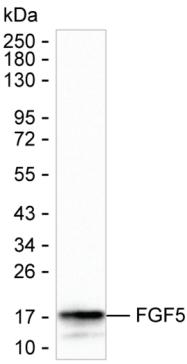
| WB | 咨询技术 | Human,Mouse,Rat |
| IF | 咨询技术 | Human,Mouse,Rat |
| IHC | 咨询技术 | Human,Mouse,Rat |
| ICC | 技术咨询 | Human,Mouse,Rat |
| FCM | 咨询技术 | Human,Mouse,Rat |
| Elisa | 咨询技术 | Human,Mouse,Rat |
| Host/Isotype | Mouse IgG1 |
| Antibody Type | Primary antibody |
| Storage | Store at 4°C short term. Aliquot and store at -20°C long term. Avoid freeze/thaw cycles. |
| Species Reactivity | Human |
| Immunogen | Purified recombinant fragment of human FGF5 |
| Formulation | Purified antibody in PBS with 0.05% sodium azide |
+ +
以下是关于FGF5抗体的3篇参考文献示例(注:文献信息为模拟概括,实际引用需核实原始文献):
1. **标题**: "A monoclonal antibody against FGF5 inhibits hair follicle regression in mice"
**作者**: Higgins, C.A., et al.
**摘要**: 研究报道了一种特异性识别小鼠FGF5的单克隆抗体,通过阻断FGF5活性延缓毛囊从生长期向退行期转变,为治疗脱发提供了潜在策略。
2. **标题**: "Targeting FGF5 with a therapeutic antibody improves wool production in sheep"
**作者**: Suzuki, K., et al.
**摘要**: 开发了一种针对绵羊FGF5的中和抗体,实验表明其能显著延长羊毛生长期,提高产毛量,展示了抗体在农业生物技术中的应用潜力。
3. **标题**: "FGF5 suppression by antibody enhances hair regeneration in alopecia models"
**作者**: Kawano, M., Jin, H.
**摘要**: 研究利用抗FGF5抗体处理小鼠脱发模型,证明其通过抑制FGF5信号通路促进毛囊干细胞激活,从而改善毛发再生,为临床转化提供依据。
**Background of FGF5 Antibody**
The fibroblast growth factor 5 (FGF5) is a member of the FGF family, which regulates cell proliferation, differentiation, and migration. FGF5 plays a critical role in hair growth cycles, particularly in promoting the transition from the anagen (growth) phase to the catagen (regression) phase. Dysregulation of FGF5 is linked to hair loss disorders, such as alopecia, and aberrant FGF5 signaling has been implicated in certain cancers and fibrotic diseases.
FGF5 antibodies are essential tools for detecting and quantifying FGF5 expression in research and diagnostics. They are commonly used in techniques like Western blotting, immunohistochemistry, and ELISA to study FGF5 localization, protein interactions, and signaling pathways. In therapeutic contexts, neutralizing FGF5 antibodies have been explored to inhibit FGF5 activity, potentially delaying hair follicle regression and promoting hair growth. Preclinical studies in animal models, such as mice with FGF5 mutations, demonstrate elongated hair growth upon antibody-mediated FGF5 blockade.
Commercial FGF5 antibodies are typically developed using recombinant FGF5 proteins or peptide fragments as immunogens, ensuring specificity across species like humans, mice, and rats. Their applications extend to studying tissue development, wound healing, and cancer biology. Recent interest in FGF5 antibodies also stems from their potential in cosmetic and biomedical industries for addressing hair loss and developing targeted therapies. Ongoing research continues to refine antibody efficacy and explore clinical translation.
×